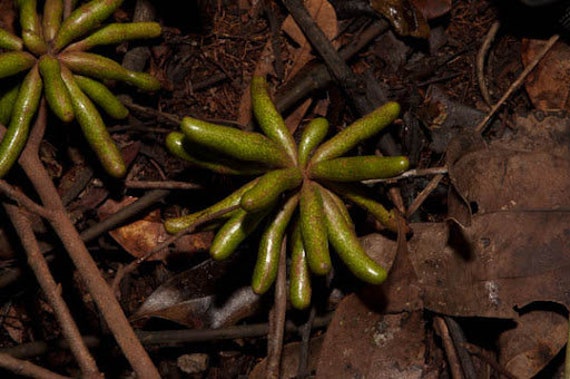Ethiopian Pepper (Xylopia aethiopica)

Xylopia aethiopica, also known as Ethiopian Pepper, black pepper, or Grains of Selim among many other common names, is a species of flowering plant in the Annonaceae family. It is native to tropical Africa and is found in moist, lowland forests. This evergreen, aromatic tree can reach up to 5 meters in height. Its leaves are oblong-elliptic, and its flowers are small and white.
X. aethiopica grows in tropical Africa, including rainforests near the coast, riverine and fringing forests, and arid savanna regions.
It is found in countries such as Ghana, Nigeria, Ethiopia, Kenya, Senegal, Sudan, and Uganda
Spice: The dried fruits of X. aethiopica, known as Grains of Selim, are used as a spice. They have a unique flavour and are commonly used in African cuisine.
An infusion of the plant’s bark or fruit has been used to treat conditions such as bronchitis, dysentery, toothaches, biliousness, and febrile pains.
Health Benefits of the Ethiopian Pepper (Xylopia aethiopica)

Xylopia aethiopica, commonly known as Ethiopian Pepper, offers a variety of health benefits. Here are some of the key advantages:
- Anti-Malarial: It has been used traditionally to combat malaria due to its anti-malarial properties.
- Natural Antibiotic: The plant exhibits antimicrobial properties, which help it fight against microbial invasion.
- Digestive Aid: It aids digestion by stimulating the secretion of digestive enzymes.
- Anti-Inflammatory: Contains bioactive compounds that exhibit anti-inflammatory effects.
- Nutritional Value: It is a source of Copper, Zinc, Protein, Camphene, Manganese, Alkaloids, Diterpenic, Limonene, Folic Acid, Flavonoid, and Vitamins A, B1, B2, C, and E
Chemical Properties of the Ethiopian Pepper (Xylopia aethiopica)
Here are some of the key chemical constituents:
- Essential Oils: The essential oil of Xylopia aethiopica is rich in compounds such as β-pinene, α-pinene, and sabinene.
- Phytochemicals: Initial phytochemical examination revealed the presence of alkaloids, flavonoids, saponins, tannins, cardiac glycosides, and steroids.
- Antimicrobial Activity: The plant has shown activity against human pathogens like Pseudomonas aeruginosa, Staphylococcus aureus, Streptococcus species, Aspergillus niger, and Mucor species.
- Anti-Cancer Properties: Compounds identified in the leaf extract such as phytol, Vitamin E, Squalene, Caryophyllene oxide, and Isoaromadendrene epoxide have demonstrated anti-cancer, anti-tumour, anti-inflammatory, antioxidant, and anti-arthritic properties
How to Use the Ethiopian Pepper (Xylopia aethiopica) as a Herbal Medicine
Ethiopian Pepper is used in various ways in traditional herbal medicine to treat different ailments. Here’s how it can be used:
- Bronchitis and Dysentery: An infusion of the plant’s bark or fruit is used to treat bronchitis and dysenteric conditions.
- Stomach Aches and Rheumatism: The bark steeped in palm wine is traditionally used to treat stomach aches and rheumatism.
- Toothaches: The root is aromatic and can be used as a mouthwash for toothaches.
- Ulcers: The powdered bark is applied to ulcers.
- Sores and Gingivitis: The powdered form of the root is used externally as a dressing for sores and gingivitis.
- Cancer Treatment: In local treatment of cancer, particularly in Nigeria, powdered root is used.
- Fever and Debility: A decoction of leaves and roots is used as a tonic to treat fever and debility.
- Headaches: The powdered leaf form is used for treating headaches.
- Digestive Issues: The fruits are carminative and can be used as a purgative. They are also used to improve fertility in women and are recommended for new mothers.
- Roundworms: An extract of the seeds treats roundworms in the body. Crushed seeds are used for headaches and neuralgia
Please note, that while these uses are based on traditional practices, it’s essential to consult with a healthcare professional before using any herbal medicine for treatment.
The side effects of Ethiopian Pepper (Xylopia aethiopica)
Ethiopian Pepper or Grains of Selim, has several health benefits, but it’s essential to be aware of potential side effects. Here’s what you need to know:
- Toxicity:
- Research has shown that despite its many beneficial effects, Grains of Selim can be toxic.
- A study revealed that the aqueous extract of Xylopia aethiopica (Negro peppers) possesses some toxic effects on the liver and kidney.
- Indiscriminate ingestion of the extract should be avoided.
While Ethiopian Pepper has valuable uses, caution should be exercised to prevent any adverse effects. Always consult with a healthcare professional before using it for medicinal purposes.
External Links
Side Effects of Ethiopian Pepper (Xylopia aethiopica)
Chemical Properties of the Ethiopian Pepper (Xylopia aethiopica)

